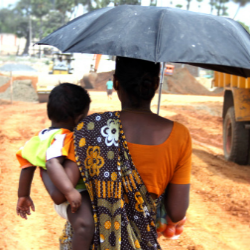
However, while individuals such as Al Gore have become figureheads of the campaign to raise awareness on the matter. The fact is that the men and women from his generation will not be the ones to experience its most catastrophic effects. This has been highlighted by a new UNICEF report on children’s perspectives on climate change.
The most pertinent figures in the report show the age demographics of the countries that will bear the brunt of climate change. Unlike the current state of western nations with their aging populations, developing countries have huge proportions of children making up their populace. As an example, Bangladesh with its vast river delta system is ranked as the most vulnerable country to climate change but 41% of its population is under 18.
Taking a broader view, there are more than 600 million children living in the 10 countries most at risk of suffering from climate change. These are all nations facing major economic challenges in the coming years on top of the environmental disasters that lie ahead. Today climate change seems like an abstract scientific story, but looking forward, the data tells us that it is going to become a major factor in upheavals in terms of health, economics and politics in the future.
The burgeoning youthful populations are also due to put enormous pressure on food production in the future. A worrying prospect when you consider developing countries across Asia, Africa and Latin America are forecast to see reductions in agricultural productivity of between 9 and 21 per cent by the 2080s due to climate change1. Spikes in food prices are notoriously linked with precipitating political crises, so this is one effect of climate change that will no doubt affect many governments this century.
Water, or the lack of, also feeds into the same risk for volatility. Currently, 1.6 billion people live in countries and regions with absolute water scarcity and the number is expected to rise to 2.8 billion people by 2025. Not only does this present a battle over resources, but at the other end of the spectrum, the prospect of too much rainfall can cause epidemics in disease. A study in Bangladesh found that the number of non-cholera diarrhoea cases per week increased by 5.1 per cent for every 10mm increase above the threshold of 52mm of average rainfall. The number of cases also increased by 3.9 per cent for every 10mm decrease below the same threshold of rainfall.2
With most of our policymakers coming from the baby boomer generation, getting meaningful commitment to tackling emissions has been an uphill battle. Climate change still doesn’t register that highly for politicians when they are campaigning on the doorstep. However, when you consider the day-to-day issues facing the young populations of developing nations as the planet warms, it is a concern policymakers across the world will have to get to grips with.
Although the UK ranks quite low on the vulnerability to climate change table, if you look at the concerns of young people, there is clear evidence that they acutely understand the danger. 74% agreed that they are worried about how climate change will affect the future of the planet and believe the world will have changed as a result by the time they are adults. The threat from global warming can still seem theoretical at times, but the overwhelming amount of evidence show us that the next generation will be the ones to experience its consequences on a practical level.
References
- 1. The Stern Review, 2007
- 2. Masahiro, H. et al., ‘Association Between Climate Variability and Hospital Visits for Non-Cholera Diarrhoea in Bangladesh: Effects and vulnerable groups’, International Journal of Epidemiology, vol. 36, no. 5, 2007, pp. 1030-1037.




